Commercial Law Case Study: Analyzing Harvey's Rights and Remedies
VerifiedAdded on 2023/06/15
|7
|2368
|419
Case Study
AI Summary
This case study analyzes Harvey's rights and remedies under commercial law, particularly concerning a contract with Litt Building Supplies Ltd. The core issue revolves around whether Harvey can reject goods (tiles, paint, and bricks) due to damages and claim compensation for failing to meet a deadline, despite an exclusion clause in Litt Building Supplies' standard terms and conditions. The analysis considers the Sale of Goods Act, focusing on whether the goods were as described, of satisfactory quality, and fit for purpose. It further examines the enforceability of the exclusion clause, considering its incorporation into the contract and relevant legislation. The study references key legal principles and case laws to determine if Litt Building Supplies can restrict Harvey's rights under the Sale of Goods Act. Desklib provides access to this and other solved assignments for students.
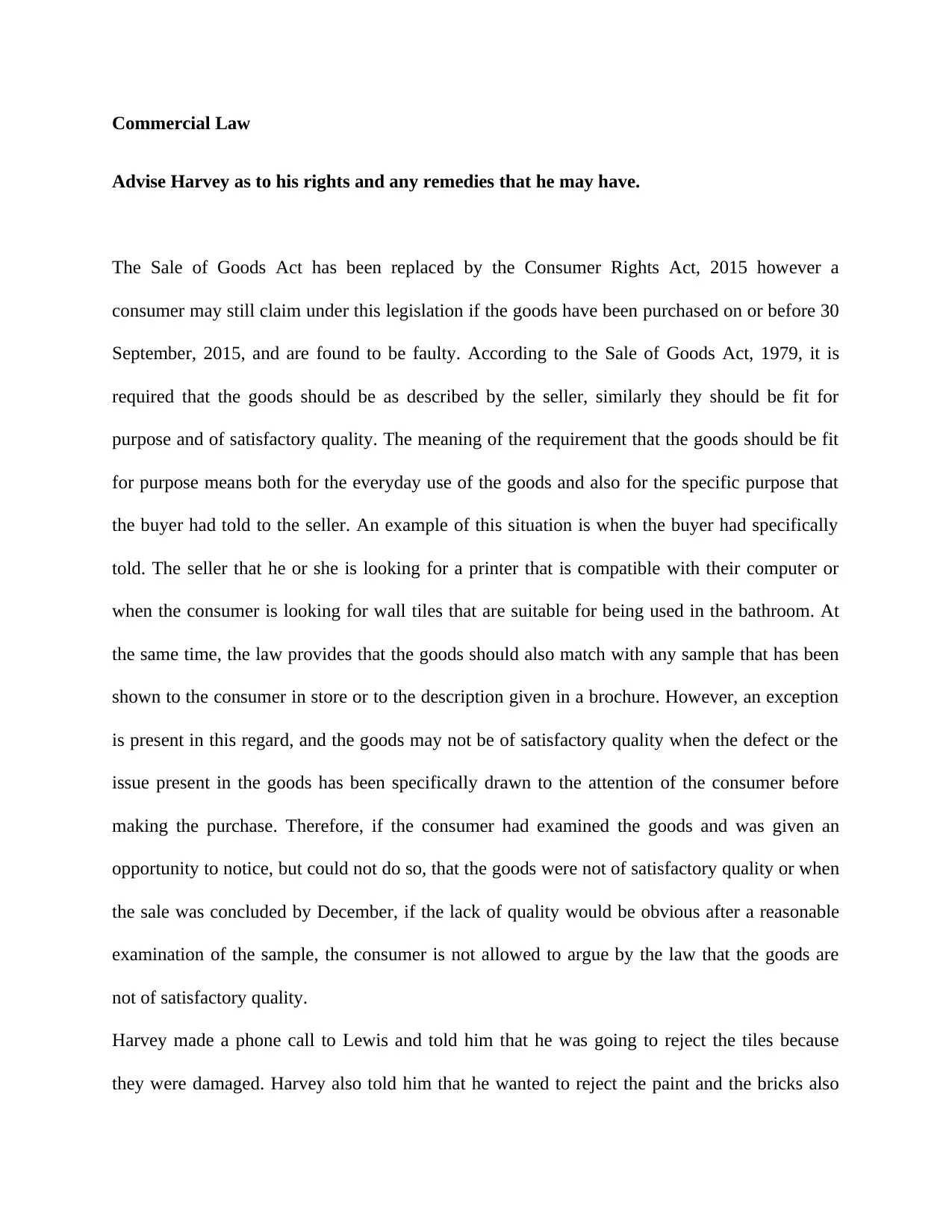
Commercial Law
Advise Harvey as to his rights and any remedies that he may have.
The Sale of Goods Act has been replaced by the Consumer Rights Act, 2015 however a
consumer may still claim under this legislation if the goods have been purchased on or before 30
September, 2015, and are found to be faulty. According to the Sale of Goods Act, 1979, it is
required that the goods should be as described by the seller, similarly they should be fit for
purpose and of satisfactory quality. The meaning of the requirement that the goods should be fit
for purpose means both for the everyday use of the goods and also for the specific purpose that
the buyer had told to the seller. An example of this situation is when the buyer had specifically
told. The seller that he or she is looking for a printer that is compatible with their computer or
when the consumer is looking for wall tiles that are suitable for being used in the bathroom. At
the same time, the law provides that the goods should also match with any sample that has been
shown to the consumer in store or to the description given in a brochure. However, an exception
is present in this regard, and the goods may not be of satisfactory quality when the defect or the
issue present in the goods has been specifically drawn to the attention of the consumer before
making the purchase. Therefore, if the consumer had examined the goods and was given an
opportunity to notice, but could not do so, that the goods were not of satisfactory quality or when
the sale was concluded by December, if the lack of quality would be obvious after a reasonable
examination of the sample, the consumer is not allowed to argue by the law that the goods are
not of satisfactory quality.
Harvey made a phone call to Lewis and told him that he was going to reject the tiles because
they were damaged. Harvey also told him that he wanted to reject the paint and the bricks also
Advise Harvey as to his rights and any remedies that he may have.
The Sale of Goods Act has been replaced by the Consumer Rights Act, 2015 however a
consumer may still claim under this legislation if the goods have been purchased on or before 30
September, 2015, and are found to be faulty. According to the Sale of Goods Act, 1979, it is
required that the goods should be as described by the seller, similarly they should be fit for
purpose and of satisfactory quality. The meaning of the requirement that the goods should be fit
for purpose means both for the everyday use of the goods and also for the specific purpose that
the buyer had told to the seller. An example of this situation is when the buyer had specifically
told. The seller that he or she is looking for a printer that is compatible with their computer or
when the consumer is looking for wall tiles that are suitable for being used in the bathroom. At
the same time, the law provides that the goods should also match with any sample that has been
shown to the consumer in store or to the description given in a brochure. However, an exception
is present in this regard, and the goods may not be of satisfactory quality when the defect or the
issue present in the goods has been specifically drawn to the attention of the consumer before
making the purchase. Therefore, if the consumer had examined the goods and was given an
opportunity to notice, but could not do so, that the goods were not of satisfactory quality or when
the sale was concluded by December, if the lack of quality would be obvious after a reasonable
examination of the sample, the consumer is not allowed to argue by the law that the goods are
not of satisfactory quality.
Harvey made a phone call to Lewis and told him that he was going to reject the tiles because
they were damaged. Harvey also told him that he wanted to reject the paint and the bricks also
Paraphrase This Document
Need a fresh take? Get an instant paraphrase of this document with our AI Paraphraser
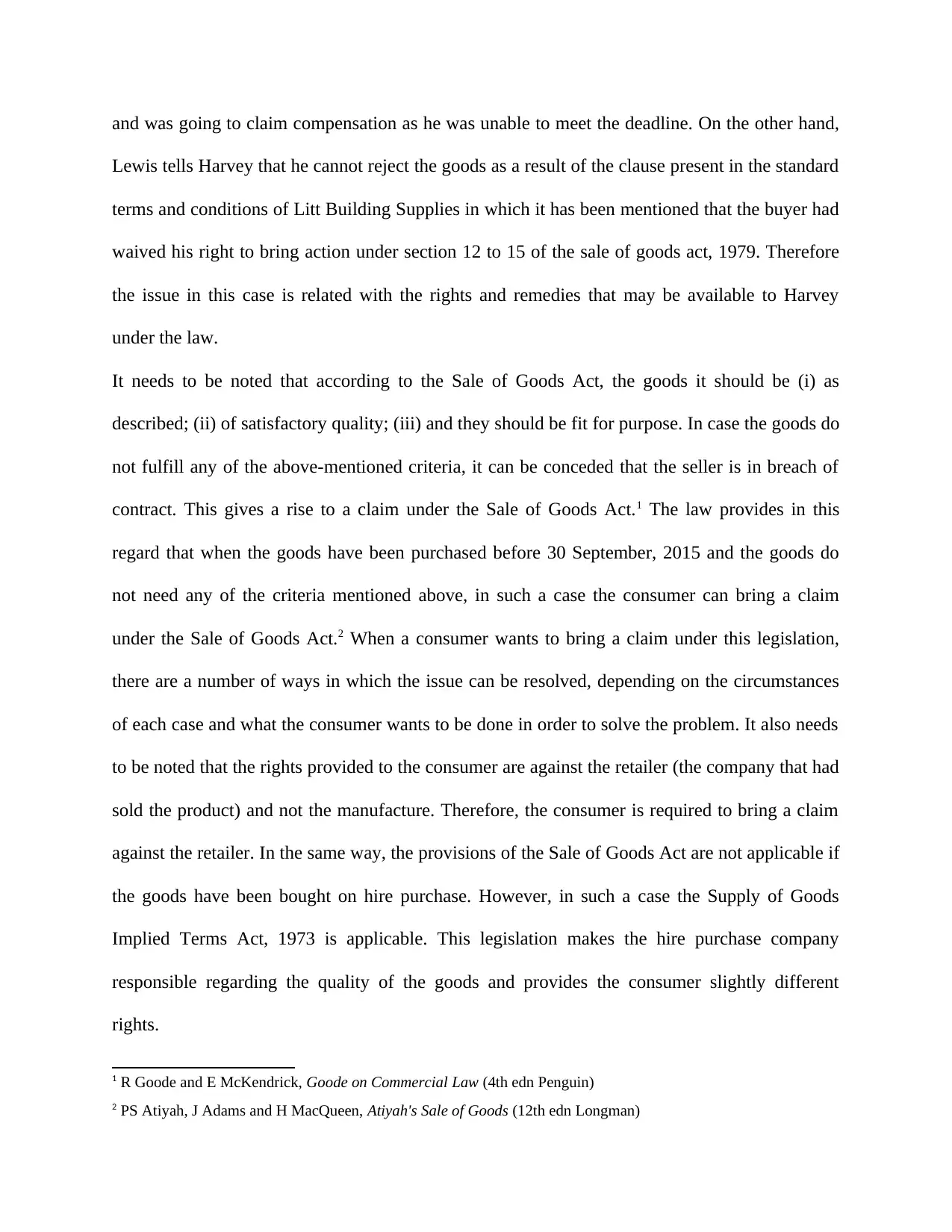
and was going to claim compensation as he was unable to meet the deadline. On the other hand,
Lewis tells Harvey that he cannot reject the goods as a result of the clause present in the standard
terms and conditions of Litt Building Supplies in which it has been mentioned that the buyer had
waived his right to bring action under section 12 to 15 of the sale of goods act, 1979. Therefore
the issue in this case is related with the rights and remedies that may be available to Harvey
under the law.
It needs to be noted that according to the Sale of Goods Act, the goods it should be (i) as
described; (ii) of satisfactory quality; (iii) and they should be fit for purpose. In case the goods do
not fulfill any of the above-mentioned criteria, it can be conceded that the seller is in breach of
contract. This gives a rise to a claim under the Sale of Goods Act.1 The law provides in this
regard that when the goods have been purchased before 30 September, 2015 and the goods do
not need any of the criteria mentioned above, in such a case the consumer can bring a claim
under the Sale of Goods Act.2 When a consumer wants to bring a claim under this legislation,
there are a number of ways in which the issue can be resolved, depending on the circumstances
of each case and what the consumer wants to be done in order to solve the problem. It also needs
to be noted that the rights provided to the consumer are against the retailer (the company that had
sold the product) and not the manufacture. Therefore, the consumer is required to bring a claim
against the retailer. In the same way, the provisions of the Sale of Goods Act are not applicable if
the goods have been bought on hire purchase. However, in such a case the Supply of Goods
Implied Terms Act, 1973 is applicable. This legislation makes the hire purchase company
responsible regarding the quality of the goods and provides the consumer slightly different
rights.
1 R Goode and E McKendrick, Goode on Commercial Law (4th edn Penguin)
2 PS Atiyah, J Adams and H MacQueen, Atiyah's Sale of Goods (12th edn Longman)
Lewis tells Harvey that he cannot reject the goods as a result of the clause present in the standard
terms and conditions of Litt Building Supplies in which it has been mentioned that the buyer had
waived his right to bring action under section 12 to 15 of the sale of goods act, 1979. Therefore
the issue in this case is related with the rights and remedies that may be available to Harvey
under the law.
It needs to be noted that according to the Sale of Goods Act, the goods it should be (i) as
described; (ii) of satisfactory quality; (iii) and they should be fit for purpose. In case the goods do
not fulfill any of the above-mentioned criteria, it can be conceded that the seller is in breach of
contract. This gives a rise to a claim under the Sale of Goods Act.1 The law provides in this
regard that when the goods have been purchased before 30 September, 2015 and the goods do
not need any of the criteria mentioned above, in such a case the consumer can bring a claim
under the Sale of Goods Act.2 When a consumer wants to bring a claim under this legislation,
there are a number of ways in which the issue can be resolved, depending on the circumstances
of each case and what the consumer wants to be done in order to solve the problem. It also needs
to be noted that the rights provided to the consumer are against the retailer (the company that had
sold the product) and not the manufacture. Therefore, the consumer is required to bring a claim
against the retailer. In the same way, the provisions of the Sale of Goods Act are not applicable if
the goods have been bought on hire purchase. However, in such a case the Supply of Goods
Implied Terms Act, 1973 is applicable. This legislation makes the hire purchase company
responsible regarding the quality of the goods and provides the consumer slightly different
rights.
1 R Goode and E McKendrick, Goode on Commercial Law (4th edn Penguin)
2 PS Atiyah, J Adams and H MacQueen, Atiyah's Sale of Goods (12th edn Longman)
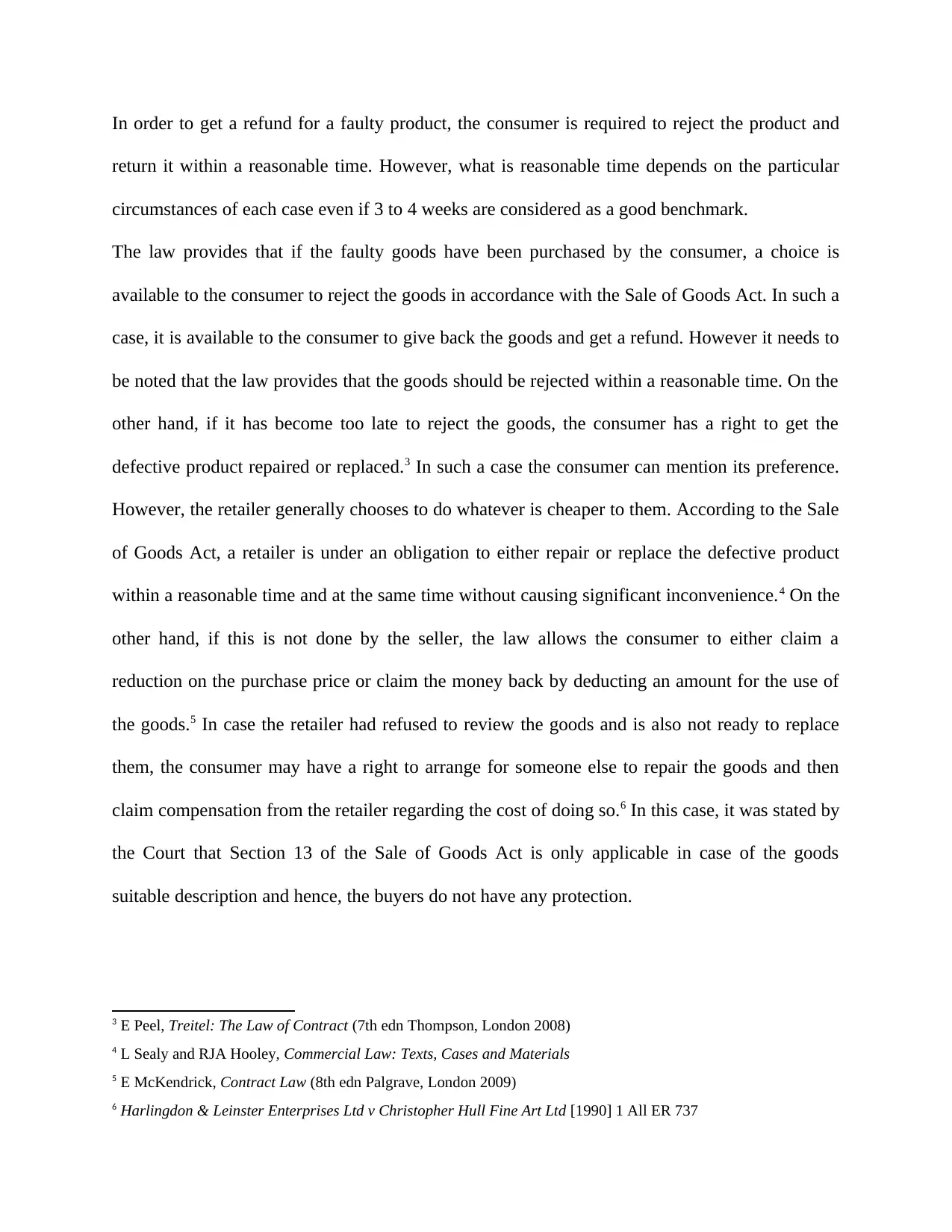
In order to get a refund for a faulty product, the consumer is required to reject the product and
return it within a reasonable time. However, what is reasonable time depends on the particular
circumstances of each case even if 3 to 4 weeks are considered as a good benchmark.
The law provides that if the faulty goods have been purchased by the consumer, a choice is
available to the consumer to reject the goods in accordance with the Sale of Goods Act. In such a
case, it is available to the consumer to give back the goods and get a refund. However it needs to
be noted that the law provides that the goods should be rejected within a reasonable time. On the
other hand, if it has become too late to reject the goods, the consumer has a right to get the
defective product repaired or replaced.3 In such a case the consumer can mention its preference.
However, the retailer generally chooses to do whatever is cheaper to them. According to the Sale
of Goods Act, a retailer is under an obligation to either repair or replace the defective product
within a reasonable time and at the same time without causing significant inconvenience.4 On the
other hand, if this is not done by the seller, the law allows the consumer to either claim a
reduction on the purchase price or claim the money back by deducting an amount for the use of
the goods.5 In case the retailer had refused to review the goods and is also not ready to replace
them, the consumer may have a right to arrange for someone else to repair the goods and then
claim compensation from the retailer regarding the cost of doing so.6 In this case, it was stated by
the Court that Section 13 of the Sale of Goods Act is only applicable in case of the goods
suitable description and hence, the buyers do not have any protection.
3 E Peel, Treitel: The Law of Contract (7th edn Thompson, London 2008)
4 L Sealy and RJA Hooley, Commercial Law: Texts, Cases and Materials
5 E McKendrick, Contract Law (8th edn Palgrave, London 2009)
6 Harlingdon & Leinster Enterprises Ltd v Christopher Hull Fine Art Ltd [1990] 1 All ER 737
return it within a reasonable time. However, what is reasonable time depends on the particular
circumstances of each case even if 3 to 4 weeks are considered as a good benchmark.
The law provides that if the faulty goods have been purchased by the consumer, a choice is
available to the consumer to reject the goods in accordance with the Sale of Goods Act. In such a
case, it is available to the consumer to give back the goods and get a refund. However it needs to
be noted that the law provides that the goods should be rejected within a reasonable time. On the
other hand, if it has become too late to reject the goods, the consumer has a right to get the
defective product repaired or replaced.3 In such a case the consumer can mention its preference.
However, the retailer generally chooses to do whatever is cheaper to them. According to the Sale
of Goods Act, a retailer is under an obligation to either repair or replace the defective product
within a reasonable time and at the same time without causing significant inconvenience.4 On the
other hand, if this is not done by the seller, the law allows the consumer to either claim a
reduction on the purchase price or claim the money back by deducting an amount for the use of
the goods.5 In case the retailer had refused to review the goods and is also not ready to replace
them, the consumer may have a right to arrange for someone else to repair the goods and then
claim compensation from the retailer regarding the cost of doing so.6 In this case, it was stated by
the Court that Section 13 of the Sale of Goods Act is only applicable in case of the goods
suitable description and hence, the buyers do not have any protection.
3 E Peel, Treitel: The Law of Contract (7th edn Thompson, London 2008)
4 L Sealy and RJA Hooley, Commercial Law: Texts, Cases and Materials
5 E McKendrick, Contract Law (8th edn Palgrave, London 2009)
6 Harlingdon & Leinster Enterprises Ltd v Christopher Hull Fine Art Ltd [1990] 1 All ER 737
⊘ This is a preview!⊘
Do you want full access?
Subscribe today to unlock all pages.

Trusted by 1+ million students worldwide
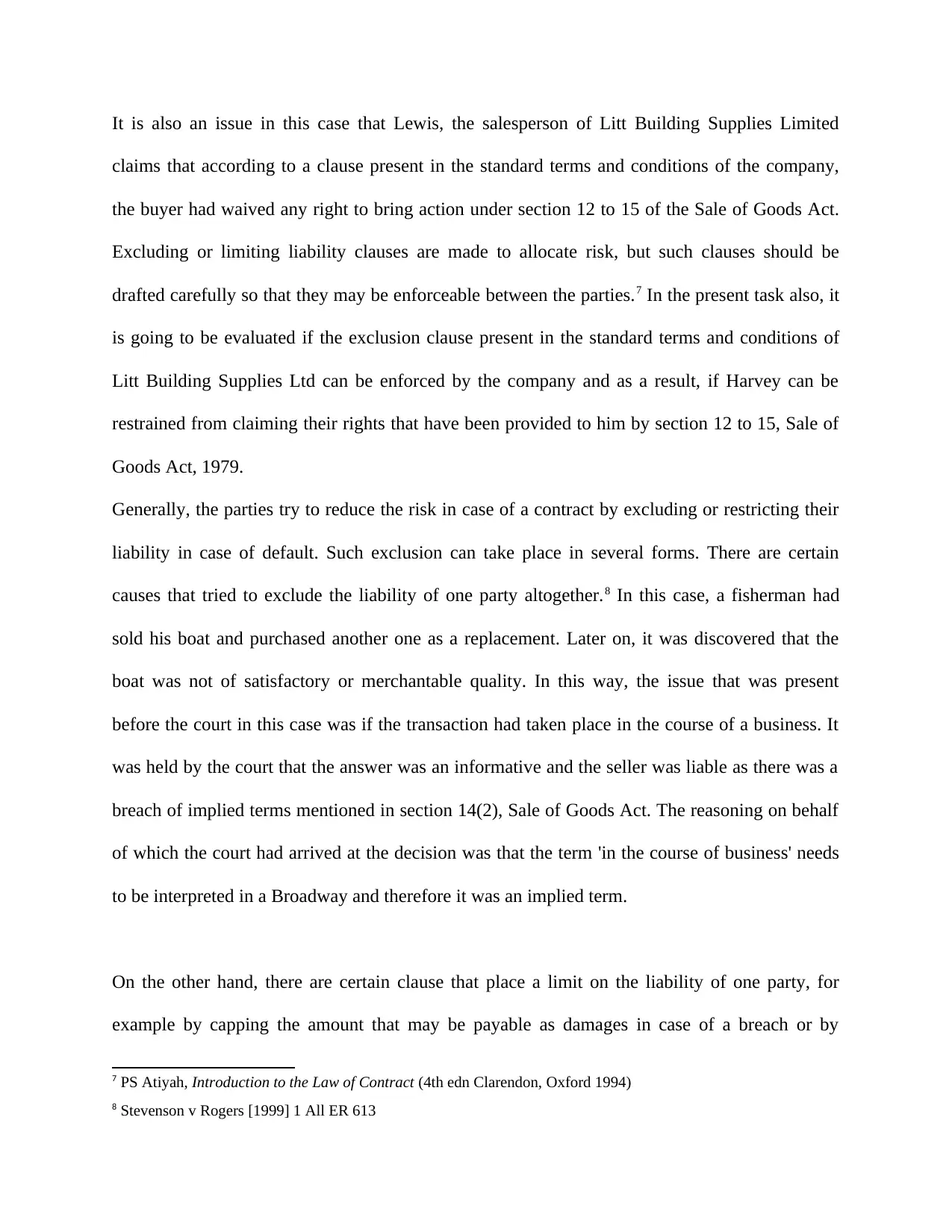
It is also an issue in this case that Lewis, the salesperson of Litt Building Supplies Limited
claims that according to a clause present in the standard terms and conditions of the company,
the buyer had waived any right to bring action under section 12 to 15 of the Sale of Goods Act.
Excluding or limiting liability clauses are made to allocate risk, but such clauses should be
drafted carefully so that they may be enforceable between the parties.7 In the present task also, it
is going to be evaluated if the exclusion clause present in the standard terms and conditions of
Litt Building Supplies Ltd can be enforced by the company and as a result, if Harvey can be
restrained from claiming their rights that have been provided to him by section 12 to 15, Sale of
Goods Act, 1979.
Generally, the parties try to reduce the risk in case of a contract by excluding or restricting their
liability in case of default. Such exclusion can take place in several forms. There are certain
causes that tried to exclude the liability of one party altogether.8 In this case, a fisherman had
sold his boat and purchased another one as a replacement. Later on, it was discovered that the
boat was not of satisfactory or merchantable quality. In this way, the issue that was present
before the court in this case was if the transaction had taken place in the course of a business. It
was held by the court that the answer was an informative and the seller was liable as there was a
breach of implied terms mentioned in section 14(2), Sale of Goods Act. The reasoning on behalf
of which the court had arrived at the decision was that the term 'in the course of business' needs
to be interpreted in a Broadway and therefore it was an implied term.
On the other hand, there are certain clause that place a limit on the liability of one party, for
example by capping the amount that may be payable as damages in case of a breach or by
7 PS Atiyah, Introduction to the Law of Contract (4th edn Clarendon, Oxford 1994)
8 Stevenson v Rogers [1999] 1 All ER 613
claims that according to a clause present in the standard terms and conditions of the company,
the buyer had waived any right to bring action under section 12 to 15 of the Sale of Goods Act.
Excluding or limiting liability clauses are made to allocate risk, but such clauses should be
drafted carefully so that they may be enforceable between the parties.7 In the present task also, it
is going to be evaluated if the exclusion clause present in the standard terms and conditions of
Litt Building Supplies Ltd can be enforced by the company and as a result, if Harvey can be
restrained from claiming their rights that have been provided to him by section 12 to 15, Sale of
Goods Act, 1979.
Generally, the parties try to reduce the risk in case of a contract by excluding or restricting their
liability in case of default. Such exclusion can take place in several forms. There are certain
causes that tried to exclude the liability of one party altogether.8 In this case, a fisherman had
sold his boat and purchased another one as a replacement. Later on, it was discovered that the
boat was not of satisfactory or merchantable quality. In this way, the issue that was present
before the court in this case was if the transaction had taken place in the course of a business. It
was held by the court that the answer was an informative and the seller was liable as there was a
breach of implied terms mentioned in section 14(2), Sale of Goods Act. The reasoning on behalf
of which the court had arrived at the decision was that the term 'in the course of business' needs
to be interpreted in a Broadway and therefore it was an implied term.
On the other hand, there are certain clause that place a limit on the liability of one party, for
example by capping the amount that may be payable as damages in case of a breach or by
7 PS Atiyah, Introduction to the Law of Contract (4th edn Clarendon, Oxford 1994)
8 Stevenson v Rogers [1999] 1 All ER 613
Paraphrase This Document
Need a fresh take? Get an instant paraphrase of this document with our AI Paraphraser
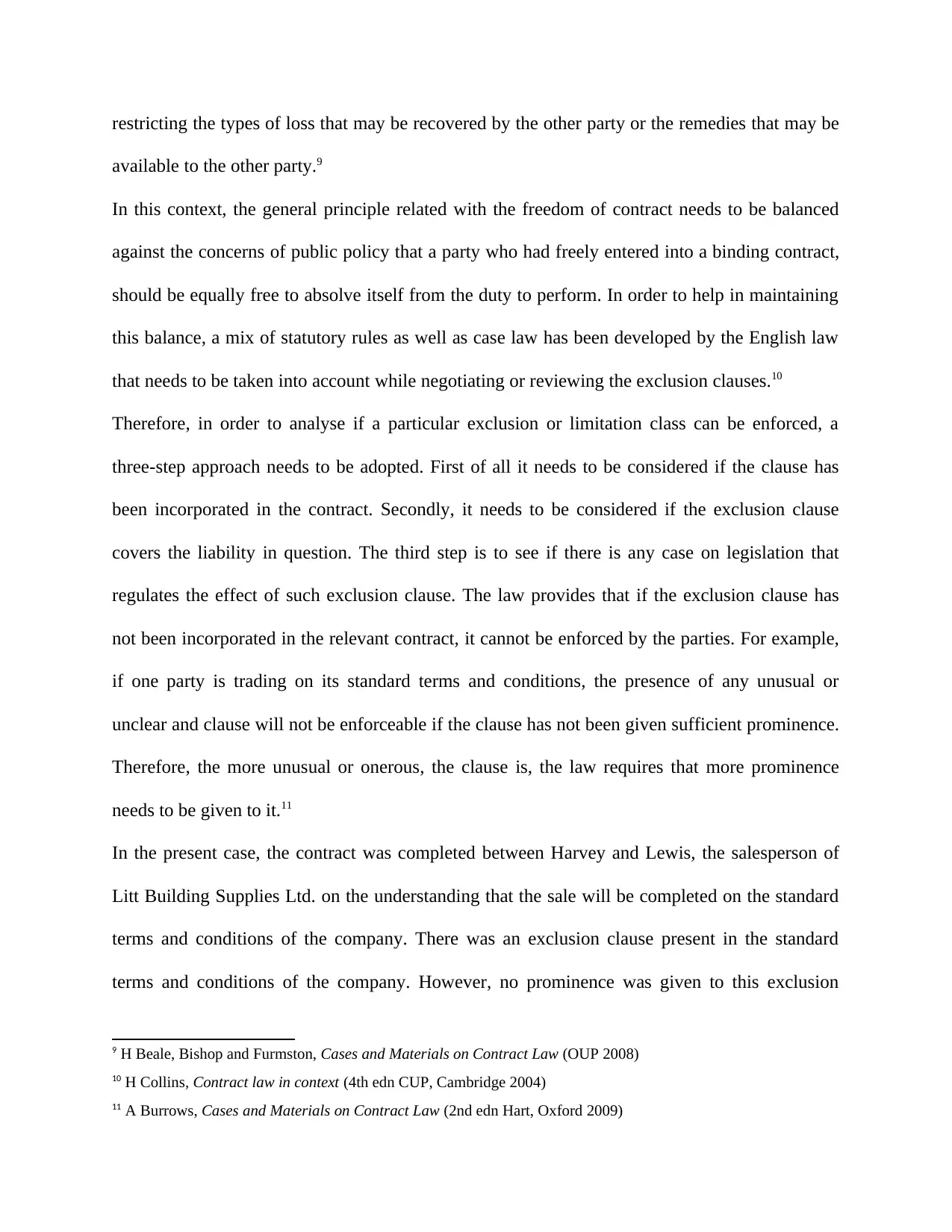
restricting the types of loss that may be recovered by the other party or the remedies that may be
available to the other party.9
In this context, the general principle related with the freedom of contract needs to be balanced
against the concerns of public policy that a party who had freely entered into a binding contract,
should be equally free to absolve itself from the duty to perform. In order to help in maintaining
this balance, a mix of statutory rules as well as case law has been developed by the English law
that needs to be taken into account while negotiating or reviewing the exclusion clauses.10
Therefore, in order to analyse if a particular exclusion or limitation class can be enforced, a
three-step approach needs to be adopted. First of all it needs to be considered if the clause has
been incorporated in the contract. Secondly, it needs to be considered if the exclusion clause
covers the liability in question. The third step is to see if there is any case on legislation that
regulates the effect of such exclusion clause. The law provides that if the exclusion clause has
not been incorporated in the relevant contract, it cannot be enforced by the parties. For example,
if one party is trading on its standard terms and conditions, the presence of any unusual or
unclear and clause will not be enforceable if the clause has not been given sufficient prominence.
Therefore, the more unusual or onerous, the clause is, the law requires that more prominence
needs to be given to it.11
In the present case, the contract was completed between Harvey and Lewis, the salesperson of
Litt Building Supplies Ltd. on the understanding that the sale will be completed on the standard
terms and conditions of the company. There was an exclusion clause present in the standard
terms and conditions of the company. However, no prominence was given to this exclusion
9 H Beale, Bishop and Furmston, Cases and Materials on Contract Law (OUP 2008)
10 H Collins, Contract law in context (4th edn CUP, Cambridge 2004)
11 A Burrows, Cases and Materials on Contract Law (2nd edn Hart, Oxford 2009)
available to the other party.9
In this context, the general principle related with the freedom of contract needs to be balanced
against the concerns of public policy that a party who had freely entered into a binding contract,
should be equally free to absolve itself from the duty to perform. In order to help in maintaining
this balance, a mix of statutory rules as well as case law has been developed by the English law
that needs to be taken into account while negotiating or reviewing the exclusion clauses.10
Therefore, in order to analyse if a particular exclusion or limitation class can be enforced, a
three-step approach needs to be adopted. First of all it needs to be considered if the clause has
been incorporated in the contract. Secondly, it needs to be considered if the exclusion clause
covers the liability in question. The third step is to see if there is any case on legislation that
regulates the effect of such exclusion clause. The law provides that if the exclusion clause has
not been incorporated in the relevant contract, it cannot be enforced by the parties. For example,
if one party is trading on its standard terms and conditions, the presence of any unusual or
unclear and clause will not be enforceable if the clause has not been given sufficient prominence.
Therefore, the more unusual or onerous, the clause is, the law requires that more prominence
needs to be given to it.11
In the present case, the contract was completed between Harvey and Lewis, the salesperson of
Litt Building Supplies Ltd. on the understanding that the sale will be completed on the standard
terms and conditions of the company. There was an exclusion clause present in the standard
terms and conditions of the company. However, no prominence was given to this exclusion
9 H Beale, Bishop and Furmston, Cases and Materials on Contract Law (OUP 2008)
10 H Collins, Contract law in context (4th edn CUP, Cambridge 2004)
11 A Burrows, Cases and Materials on Contract Law (2nd edn Hart, Oxford 2009)
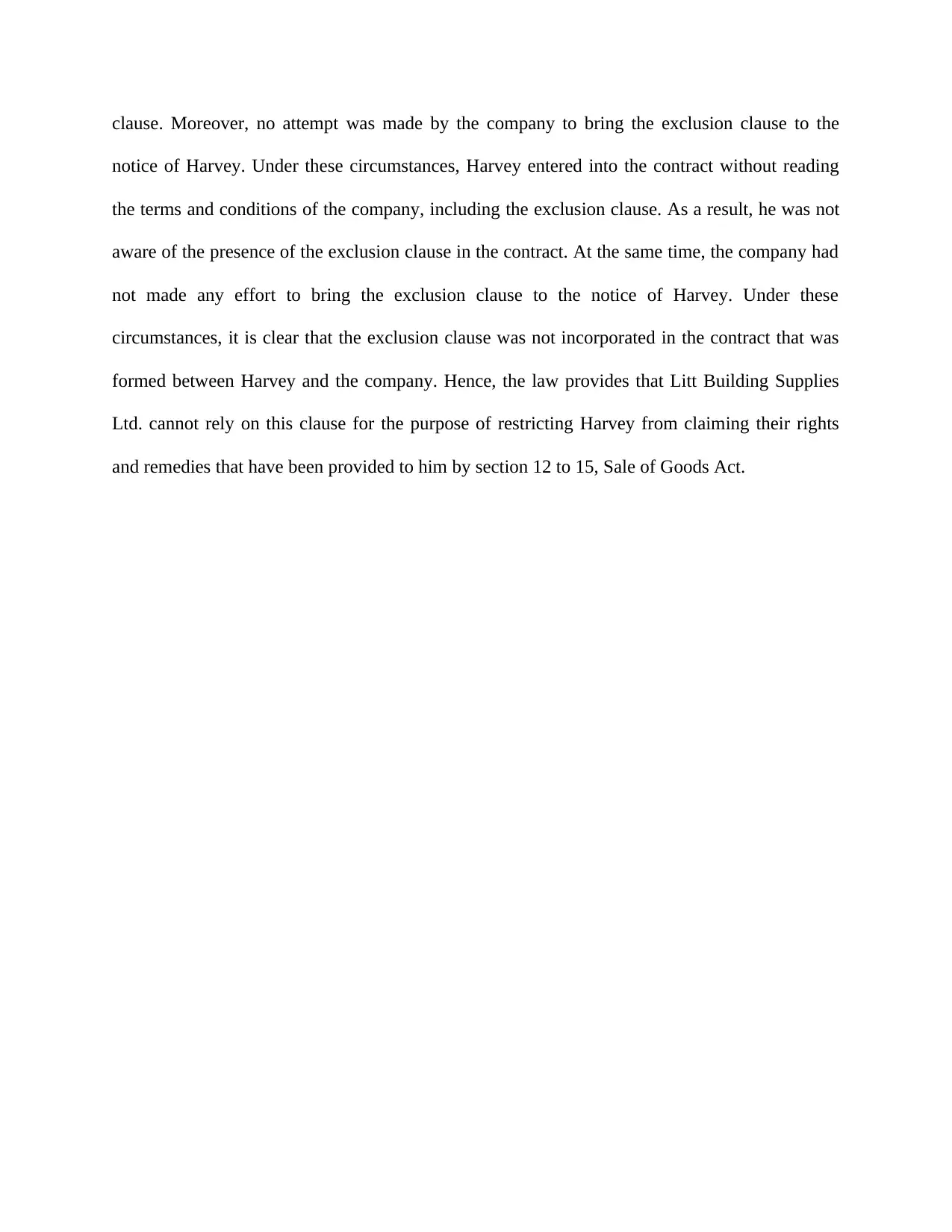
clause. Moreover, no attempt was made by the company to bring the exclusion clause to the
notice of Harvey. Under these circumstances, Harvey entered into the contract without reading
the terms and conditions of the company, including the exclusion clause. As a result, he was not
aware of the presence of the exclusion clause in the contract. At the same time, the company had
not made any effort to bring the exclusion clause to the notice of Harvey. Under these
circumstances, it is clear that the exclusion clause was not incorporated in the contract that was
formed between Harvey and the company. Hence, the law provides that Litt Building Supplies
Ltd. cannot rely on this clause for the purpose of restricting Harvey from claiming their rights
and remedies that have been provided to him by section 12 to 15, Sale of Goods Act.
notice of Harvey. Under these circumstances, Harvey entered into the contract without reading
the terms and conditions of the company, including the exclusion clause. As a result, he was not
aware of the presence of the exclusion clause in the contract. At the same time, the company had
not made any effort to bring the exclusion clause to the notice of Harvey. Under these
circumstances, it is clear that the exclusion clause was not incorporated in the contract that was
formed between Harvey and the company. Hence, the law provides that Litt Building Supplies
Ltd. cannot rely on this clause for the purpose of restricting Harvey from claiming their rights
and remedies that have been provided to him by section 12 to 15, Sale of Goods Act.
⊘ This is a preview!⊘
Do you want full access?
Subscribe today to unlock all pages.

Trusted by 1+ million students worldwide
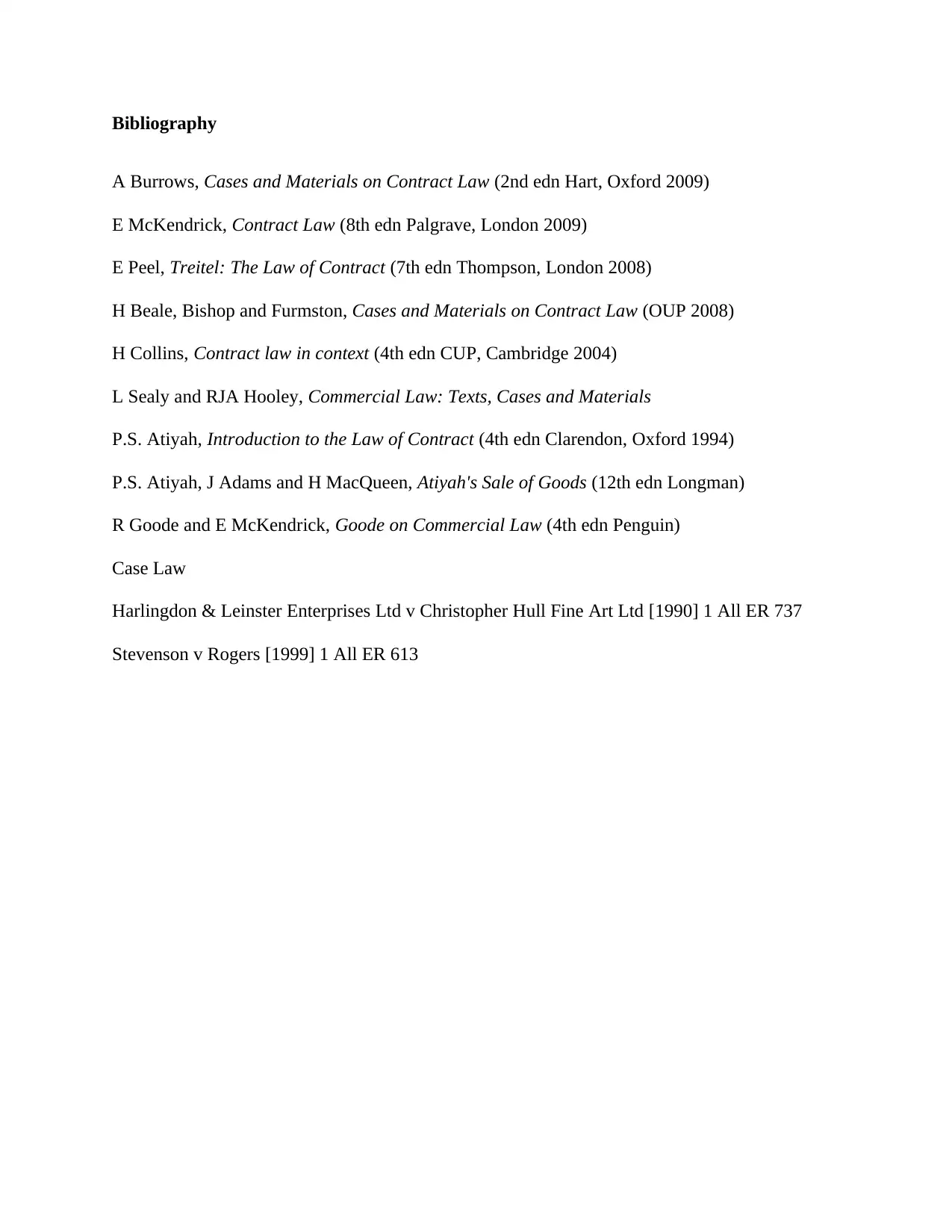
Bibliography
A Burrows, Cases and Materials on Contract Law (2nd edn Hart, Oxford 2009)
E McKendrick, Contract Law (8th edn Palgrave, London 2009)
E Peel, Treitel: The Law of Contract (7th edn Thompson, London 2008)
H Beale, Bishop and Furmston, Cases and Materials on Contract Law (OUP 2008)
H Collins, Contract law in context (4th edn CUP, Cambridge 2004)
L Sealy and RJA Hooley, Commercial Law: Texts, Cases and Materials
P.S. Atiyah, Introduction to the Law of Contract (4th edn Clarendon, Oxford 1994)
P.S. Atiyah, J Adams and H MacQueen, Atiyah's Sale of Goods (12th edn Longman)
R Goode and E McKendrick, Goode on Commercial Law (4th edn Penguin)
Case Law
Harlingdon & Leinster Enterprises Ltd v Christopher Hull Fine Art Ltd [1990] 1 All ER 737
Stevenson v Rogers [1999] 1 All ER 613
A Burrows, Cases and Materials on Contract Law (2nd edn Hart, Oxford 2009)
E McKendrick, Contract Law (8th edn Palgrave, London 2009)
E Peel, Treitel: The Law of Contract (7th edn Thompson, London 2008)
H Beale, Bishop and Furmston, Cases and Materials on Contract Law (OUP 2008)
H Collins, Contract law in context (4th edn CUP, Cambridge 2004)
L Sealy and RJA Hooley, Commercial Law: Texts, Cases and Materials
P.S. Atiyah, Introduction to the Law of Contract (4th edn Clarendon, Oxford 1994)
P.S. Atiyah, J Adams and H MacQueen, Atiyah's Sale of Goods (12th edn Longman)
R Goode and E McKendrick, Goode on Commercial Law (4th edn Penguin)
Case Law
Harlingdon & Leinster Enterprises Ltd v Christopher Hull Fine Art Ltd [1990] 1 All ER 737
Stevenson v Rogers [1999] 1 All ER 613
1 out of 7
Related Documents
Your All-in-One AI-Powered Toolkit for Academic Success.
+13062052269
info@desklib.com
Available 24*7 on WhatsApp / Email
![[object Object]](/_next/static/media/star-bottom.7253800d.svg)
Unlock your academic potential
Copyright © 2020–2026 A2Z Services. All Rights Reserved. Developed and managed by ZUCOL.




